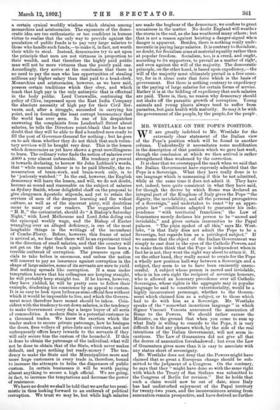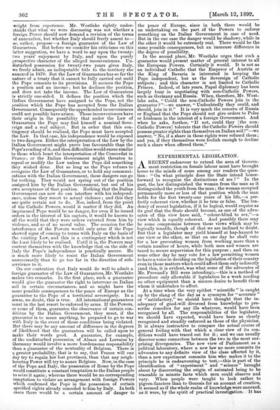MR. WESTLAKE ON THE POPE'S POSITION.
WE are greatly indebted to Mr. Westlake for the extremely clear statement of the Italian view of the Pope's position which will be found in another column. Undoubtedly it necessitates some modification in the description of that position which we gave last week, though the conclusion at which we then arrived is rather strengthened than weakened by the correction.
It is clear that we overstepped the mark when we said that the Italian Government have expressly admitted that the Pope is a Sovereign. What they have really done is to use language which is unmeaning if this be not admitted, while at the same time it does not admit it. They have not, indeed, been quite consistent in what they have said, for though the decree by which Rome was declared an integral part of the Kingdom of Italy gives the Pope "the dignity, the inviolability, and all the personal prerogatives of a Sovereign," and undertakes to enact "by an appro- priate law" conditions adapted to guarantee his inde- pendence "with territorial franchises," the Law of Guarantees merely declares his person to be "sacred and inviolable," and gives certain immunities to the Papal palaces. "The plain upshot of all this," says Mr. West- lake, "is that Italy does not admit the Pope to be a Sovereign, but regards him as a privileged subject." If we assume that the object of the Italian Government was simply to cast dust in the eyes of the Catholic Powers, and to make them think that the Pope is independent when in fact he is not, they went the right way about to attain it. If, on the other hand, they really meant to create for the Pope a wholly new position half-way between a Sovereign and a subject, they seem to us to have been eminently unsuc- cessful. A subject whose person is sacred and inviolable, who is in his own right the recipient of sovereign honours, who is allowed an honorary precedence over all Catholic Sovereigns, whose rights in the aggregate may in popular language be said to constitute exterritoriality, would be a highly inconvenient personage, whether to the Govern- ment which claimed him as a subject, or to those which had to do with him as a Sovereign. Mr. Westlake speaks of the "somewhat incautious language" in which Signor Visconti Venosta announced the annexation of Rome to the Powers. We should rather excuse the Minister, on the ground that when you come to sum up what Italy is willing to concede to the Pope, it is very difficult to find any phrases which, by the side of the real intentions of the Italian Government, will not seem in- cautious. The Law of Guarantees did not give all that the decree of annexation foreshadowed ; but even the Law of Guarantees gives more than it is easy to associate with any status short of sovereignty. Mr. Westlake does not deny that the Powers might have claimed that so great a European change should be sub- mitted to the judgment of a Congress. On the contrary, he says that they "might have done so with the same right with which the Treaty of San Stefano was submitted to the Congress of Berlin for revision." But he holds that such a claim would now be out of date, since Italy has had undisturbed enjoyment of the Papal territory for twenty-two years, and the inconveniences arising from annexation remain prospective, and have derived no further weight from experience. Mr. Westlake rightly under- stands that what we were discussing was not whether a foreign Power should now demand a revision of the terms of annexation, but whether Italy should freely assent to— or, rather, propose—a foreign guarantee of the Law of Guarantees. But before we consider his criticisms on this latter suggestion, we have a word to say upon the twenty- two years' enjoyment by Italy, and upon the purely prospective character of the alleged inconveniences. Un- disturbed possession for twenty-two years gives Italy, we freely admit, an indisputable title to the territory she annexed in 1870. But the Law of Guarantees has so far the nature of a treaty that it cannot be fully carried out until the Pope consents to its provisions. It secures the Pope a position and an income ; but he declines the position, and does not take the income. The Law of Guarantees is strictly one-sided. It defines the position which the Italian Government have assigned to the Pope, not the position which the Pope has accepted from the Italian Government. Consequently the apprehended inconveniences could not possibly have arisen. Those inconveniences have their origin in the possibility that under the Law of Guarantees the Pope may find himself a nominal Sove- reign and a real subject. But in order that this con- tingency should be realised, the Pope must have accepted the Law. In that case, his independence would be exposed to two dangers. Either the interpretation of the Law by the Italian Government might prove less favourable than the Pope's reading of it, and then difficulties would ensue similar to those which beset the interpretation of the Concordat in France; or the Italian Government might threaten to repeal or modify the Law unless the Pope did something they wished done. But so long as the Pope refuses to recognise the Law of Guarantees, or to hold any communi- cations with the Italian Government, these dangers can go for nothing. They would not spring out of the position assigned him by the Italian Government, but out of his own acceptance of that position. Nothing that the Italian Government can now do can interfere with his independ- ence, unless they resort to actual violence ; and this they are quite certain not to do. Nor, indeed, from the point of the Catholic Powers, would it matter if they did. An imprisoned Pope would be no danger, for even if he issued orders in the interest of his captors, it would be known to all the world that they were orders extorted from him by violence, and so of no moral value. The occasion for the interference of the Powers would only arise if the Pope showed signs of coming to terms with Italy on the basis of the existing Law, and this is a contingency which is not the least likely to be realised. Until it is, the Powers may content themselves with the knowledge that on the side of Italy the Pope's independence is practically secure. He is much more likely to resist the Italian Government unnecessarily than to go too far in the direction of sub- servience to it.
On our contention that Italy would do well to admit a foreign guarantee of the Law of Guarantees, Mr. Westlake makes two remarks. In the first place, such a guarantee would give the guarantor the right to intervene on Italian soil in certain circumstances, and so might have the same possible consequences to the peace of Europe as the guarantee to the Pope of a territorial sovereignty. In a sense, no doubt, this is true. All international guarantees must in the last resort be enforced by arms. If the Powers, or some of them, guarantee the observance of certain con- ditions by the Italian Government, they must, if the guarantee is to mean anything, be prepared to go to war with Italy in the event of those conditions being violated. But there may be any amount of difference in the degrees of likelihood that the guarantors will be called upon to make their words good. A guarantee, for example, of the undisturbed possession of Alsace and Lorraine by Germany would involve a more burdensome responsibility than a guarantee of the neutrality of Belgium. There is a greater probability, that is to say, that France will one day try to regain her lost provinces, than that any neigh- bouring Power will try to annex Belgium. Now, in the case of the Pope and Italy, the possession of Rome by the Pope would constitute a constant temptation to the Italian people to seize it again ; whereas there would be no corresponding temptation to violate an arrangement with foreign Powers which confirmed the Pope in the possession of certain specified rights already conceded to him by Italy. In both cases there would be a certain amount of danger to the peace of Europe, since in both there would be an undertaking on the part of the Powers to enforce something on the Italian Government in case of need. But in the one case the danger would be shadowy, while in the other it would be extremely real. There would be the same possible consequences, but an immense difference in the degree of possibility. In the second place, Mr. Westlake urges that such a guarantee would present matter of general interest to all the European Powers. Certainly it would. It is not as an individual Catholic that the Emperor of Austria or the King of Bavaria is interested in keeping the Pope independent, but as the Sovereign of Catholic subjects ; and this character is not limited to Catholic Princes. Indeed, of late years, Papal diplomacy has been largely busy in negotiating with non-Catholic Powers, such as Germany and Russia. When, therefore, Mr. West- lake asks, "Could the non-Catholic Powers join in the guarantee ?"—we answer, "Undoubtedly they could, and should, join in it." It is very much the concern of Russia or England that the Pope should not give orders to Poles or Irishmen in the interest of a foreign Government. And when he asks, further, "If not, could they [the non- Catholic Powers] tolerate that the Catholic Powers should possess greater rights than themselves on Italian soil ?"—we answer, "No, if a share in these rights were refused them ; and yes, if they themselves were foolish enough to decline such a share when offered them."



































 Previous page
Previous page